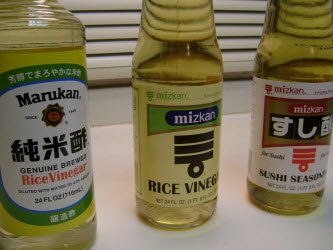Rice Vinegar
One of the main Ingredients used in Sushi Rice has an interesting History as well as many other applications and uses...
Stay Tuned to find out what they are!
Vinegar - A History Lesson
To learn about Rice Vinegar and where it came from, one must actually go back to the origins of vinegar itself.
- As early as 5000 B.C. the Babylonians were using the fruit of date palms to make wine (to be used as a food), and vinegar (to be used as a preservative and pickling agent).
- In ancient Egypt, residue of vinegar was found in urns and was dated back to around 3000 B.C.
- The first written history of vinegar in China was around 1200 B.C.
- One of the first notable events of vinegar use in Japan, was recorded around the year 794 and mentioned that Samurai warriors used vinegar as a tonic because they thought it gave them power and strength.
Japanese Rice Vinegar - What is was...
Real Japanese rice vinegar, is around 4% acidity. Less than many fruit-based vinegars like plum, tart cherry and persimmon which are many times made at home and also less than the blended variations that have all but replaced it.
The reason I say this is because most vinegar used in Japan today is actually a blend of wheat, corn and rice vinegars with sake lees (also called sake kasu---the thick rice paste that’s left at the end of the sake-making process) and alcohol added in for good measure; not the true original version.
Large mass producers, Marukan being one, is an example of these "modern" blended variations.
These new variations have become widely accepted however, and the distinction between the "true" original and these blended varieties is almost never even noticed or better yet, probably not even known anymore.
Japanese Rice Vinegar ("Komezu") - And what it is Now...
Today, "Komezu", ranges from being colorless to a pale yellow and is very mild and mellow (having around 5% acidity).
They are used to make sunomono ("vinegar dishes"), tsukemono ("pickles"), nimono ("simmered dishes") as well as in marinades and sauces.
The seasoned variety or "Awasezu" is made by adding Sake, Sugar and Salt to Komezu. It is then used in making sushi rice and salad dressings like ginger or sesame dressing.
Possible Health Benefits
Vinegar has long been accepted as having many medicinal health benefits. Ranging from reducing blood pressure to being used a skin tonic.
One that is also notable to mention however, comes from a lighter form of black vinegar called kurozu, which is made from rice and is considered to be a healthy drink.
What is interesting about this is that it's manufacturers claims that it contains high concentrations of amino acids (9 are essential because they cannot be created from other compounds in the human body). And recent studies seem to support this. Scientific research on kurozu has revealed its anti-cancer properties in rats in vivo (in whole living organisms) and in vitro (on components of an organism) on human cancer cells.
It seems that vinegar truly does have more benefits than just making Sushi Rice taste good.
Like this Page?
|
|
Follow me on Pinterest









New! Comments
Have your say about what you just read! Leave me a comment in the box below.